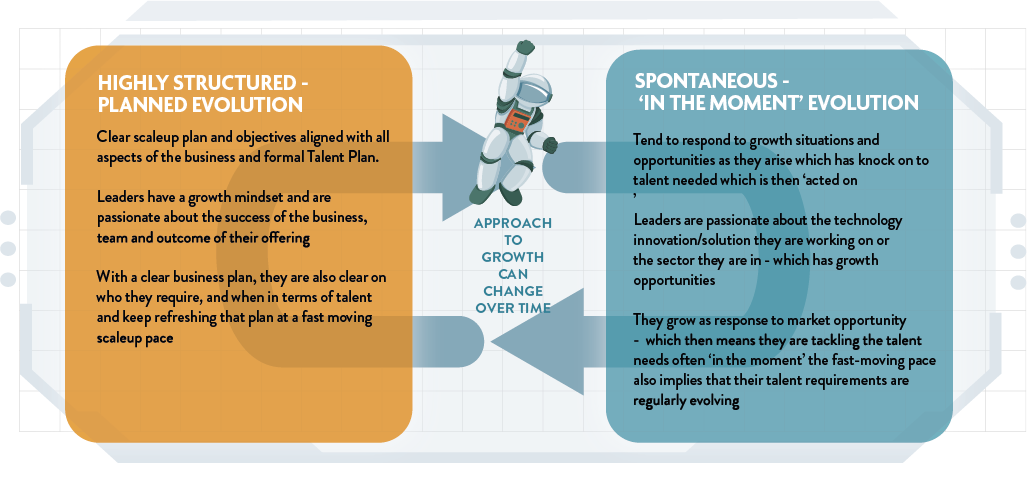Explore the ScaleUp Annual Review 2022
Select a section to expand and explore this year's review..
CONTENTS

Introduction 2022

Chapter 1 2022
The ScaleUp Business Landscape

Chapter 2 2022
Leading Programmes Breaking Down the Barriers for Scaleups

Chapter 3 2022
The Local Scaleup Ecosystem

Chapter 4 2022
The Policy Landscape

Chapter 5 2022
Looking forward

Annexes 2022

SCALEUP STORIES 2022
The Scale of Need: Understanding the talent development needs of scaleups
How can the scaleup ecosystem better understand and respond effectively to the needs of scaleups who are seeking to access the right talent and skills to achieve their growth ambitions? A report, undertaken by the ScaleUp Institute supported by Innovate UK and research partners, provides insights into the dynamics of scaleup talent development.
The report, based on years of data findings from the ScaleUp Institute’s annual survey alongside a series of in-depth interviews with scaleup leaders, provides insights into how scaleups from different sectors and geographies and at different stages of growth, approach their talent needs, recruitment and development.
It identifies the key skills gaps of scaling businesses and the wider challenges they face when trying to attract and retain skilled employees – and it explores their viewpoints on succession planning, diversity and inclusion, future technologies and what further support and guidance they seek to develop the necessary talent pool for their scaling and international aspirations.
Structured or spontaneous: a lens through which to view scaleup talent development
One particular and valuable lens through which to view talent development among scaleups is their “personas”.
All scaleups are proactive and driven by their growth ambitions. The ways in which they approach their growth lie on a spectrum from the highly structured – those who have a clear plan and strategy, with a formalised approach to their talent needs, plans and structures – to the more spontaneous – who manage and deal with opportunities and talent needs as situations arise.
It is therefore often important to consider the business leader’s own personal journey which can set the tone and culture of the business as it grows and scales. Scaleup businesses are often “outside the norm” in the way they offer services and products that stand out from their competitors, and this often feeds through in terms of the range or combination of skills that they need. They recognise the blend of skills needed from formal training and experience but also in terms of attitude.
Understanding highly structured scaleups
The more highly structured scaling businesses tend to have CEOs with transferable business skills and who are focused on growth regardless of sector or the individual business. In essence, such CEOs could run a completely different company and be equally passionate about it.
These scaleups had defined targets and goals, such as:
- A very clear and precise objective or set of objectives and goals usually aligned with a well-defined business model, including talent pipeline plans, from the outset.
- A very clear picture of who they need and when; because their business plan and growth intrinsically depends upon their talent foundations and access.
- A formal set of regulatory processes that require adherence from the earliest stages (e.g. regulatory compliance in sectors such as pharmaceuticals or fintech) in order to be allowed to trade, forcing certain talent requirements.
The CEOs running structured scaleups were passionate about:
- The prospect of success (for the business, and by extension, themselves).
- Their team; both the senior leadership team and their people – and more broadly, the business culture.
- The outcomes of the unique product or service solution they had developed and were continuing to refine.
Understanding spontaneous scaleups
These scaling businesses describe their growth in terms of being able to take advantage of opportunities or reacting to changes at particular moments (such as a change in legislation).
Their leaders were equally as passionate as their highly structured colleagues but they tend to be more focused on:
- The technical excellence and ‘beauty’ of the technology or solution they were working on.
- The sector they were in; whether love of the sector or passion for reforming or disrupting that sector.
These CEOs tend to be individuals who are highly skilled, experienced or creative in a particular field who take on a leadership/ownership role as a consequence of that high level of skill and engagement.
As at times growth was not planned for per se, their talent needs would also arise on an ad-hoc basis, which sometimes brings its own challenges.
One of the issues for more spontaneous scaleups was that rather than having an aggressive plan for growth and knowing ahead of time that they needed a corporate structure in place in order to deal with this, sudden growth seemed to initially take them by surprise and forced them to change the way the business was operated.
When businesses evolved like this, it was more likely that they would discover they had placed “round pegs in square holes,” creating new and additional talent management challenges.
Moving from a spontaneous to structured model
Scaleups can benefit from being more structured in their outlook, attitude and behaviours, however maintaining a level of spontaneity to exploit new markets and innovations was also considered vital. Some of the nudges that can help trigger greater structure were observed to be:
- Pace of Growth
- As growth accelerated, leaders thought more about the future, long term plans and exit strategy.
- Increased need for funding leading to renewed fundraising efforts and looking for financial support.
- Need to bring in a new senior team member or NED with fresh ideas.
- Financial Intervention
- The discipline of having to go through various funding rounds and present the business proposition and the strategy externally to investors.
- Sometimes an investor representative added a surprising amount of value.
- Public sector investment: Innovate UK, BGF.
- A merger or an acquisition.
- Regulatory environment or requirements
- R&D tax credits.
- Change in regulation.
- Environmental changes beyond control of the business
- The pandemic and now the current macro trends of increasing costs are forcing many scaleups to rethink their business model and future plans.
Conclusion
The report highlights a number of opportunities to enhance the talent pipeline for scaleups and the talent requirements at all levels of business from building board capabilities through networks of non-executive directors to enhancing connectivity with the education sector and role modelling jobs of the future. It enables the ecosystem – at private and public level – to consider the practical solutions that can be brought to bear to support their scaleup growth and how public, private and education stakeholders can collectively step up and meet their needs.

CONTENTS

Introduction 2022

Chapter 1 2022
The ScaleUp Business Landscape

Chapter 2 2022
Leading Programmes Breaking Down the Barriers for Scaleups

Chapter 3 2022
The Local Scaleup Ecosystem

Chapter 4 2022
The Policy Landscape

Chapter 5 2022
Looking forward

Annexes 2022

SCALEUP STORIES 2022


 Previous
Previous

Share